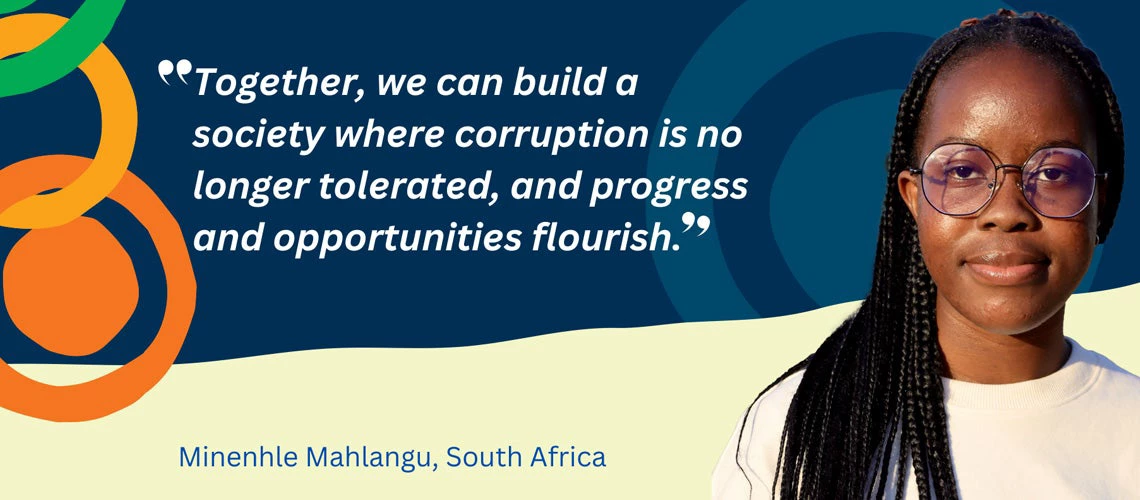 Minenhle Mahlangu
Minenhle Mahlangu
This is one of two winning blogs from the World Bank's International Corruption Hunters Alliance 2023 Blog Contest. In an effort to find a common solution to a common challenge, we asked to hear the views of African youth on the challenges of corruption. We asked for submissions, based on the situation in the blogger’s country, that answered the following question: How can young people work with their governments, academia, and civil society organizations to speak up against corruption and counter the negative impacts corruption has on society?
Corruption poses a significant threat to society, hindering progress and impacting the lives of individuals, particularly the youth. By collaborating and employing innovative strategies, young individuals can play a crucial role in speaking up against corruption and countering its negative impacts. Here are five approaches that young people can embrace:
Gamification for Anti-Corruption:
Harnessing technology, young individuals can develop interactive mobile games or apps that simulate real-life corruption scenarios. This approach raises awareness and promotes integrity and accountability among players. Through these tools, young people learn about the consequences of corruption, make ethical choices, and understand the importance of transparency and fairness. By gamifying the anti-corruption message, young people actively participate in the fight against corruption.
Corruption Hackathons:
Organizing corruption-focused hackathons brings together young coders, designers, and problem-solvers to develop innovative technological solutions. These events provide a platform for brainstorming ideas, creating prototypes, and developing tools to combat corruption effectively. The solutions generated can range from anti-corruption reporting platforms to citizen engagement apps. Corruption hackathons offer young people the opportunity to contribute their skills and make a tangible impact in the fight against corruption.
Corruption-Free Business Certification:
Young people can establish a certification program that recognizes and promotes businesses operating with transparency, integrity, and anti-corruption practices. This initiative incentivizes businesses to uphold high ethical standards and promotes a culture of integrity. By obtaining the certification, businesses demonstrate their commitment to combating corruption and gain trust from consumers and partners. The program can be developed in collaboration with government agencies, industry associations, and civil society organizations, contributing to a sustainable and responsible business ecosystem.
Transparency Cafes:
Transparency Cafes provide a space for young people to host public events in coffee shops or community spaces, fostering discussions, knowledge-sharing, and learning about corruption issues. These gatherings bring together individuals from diverse backgrounds, including government officials, academics, activists, and concerned citizens. Through presentations, panel discussions, and workshops, Transparency Cafes offer a platform to understand the complexities of corruption, explore solutions, and learn from each other's experiences. By organizing and participating in these cafes, young people actively contribute to raising awareness, fostering dialogue, and inspiring action against corruption.
Corruption Storytelling Podcasts:
Young individuals can create and promote corruption storytelling podcasts, featuring personal stories, interviews, and discussions related to corruption. These podcasts delve into the impact of corruption on individuals and communities, highlight successful anti-corruption initiatives, and explore systemic challenges. By sharing compelling narratives and insights, corruption storytelling podcasts raise awareness, stimulate critical thinking, and encourage discussions They provide a platform for individuals to share experiences, insights, and solutions, creating a collective voice against corruption. Through these podcasts, young people can engage a wider audience, reach different demographics, and inspire action against corruption.
Young people have a unique perspective and energy that can drive positive change in the fight against corruption. Embracing the above approaches, youth can engage wider audiences, raise awareness, and promote transparency, integrity, and accountability. Together, we can build a society where corruption is no longer tolerated, and progress and opportunities flourish.


Join the Conversation